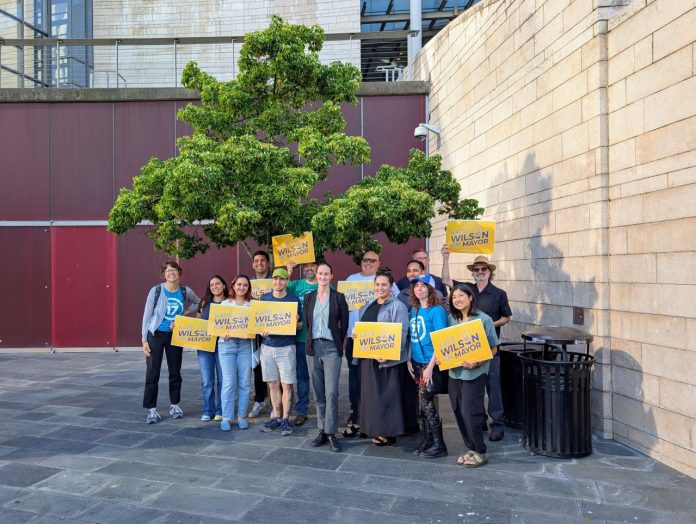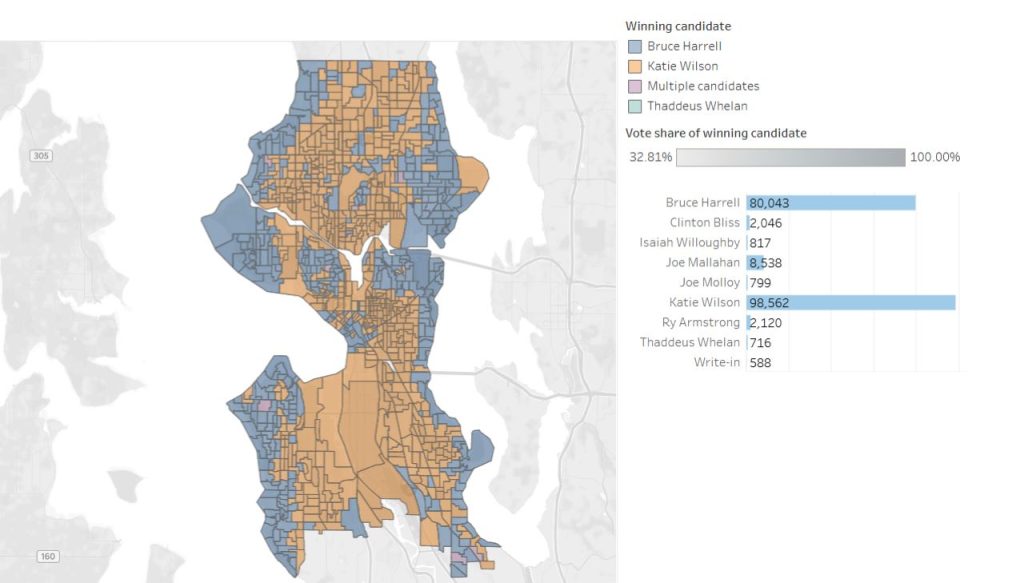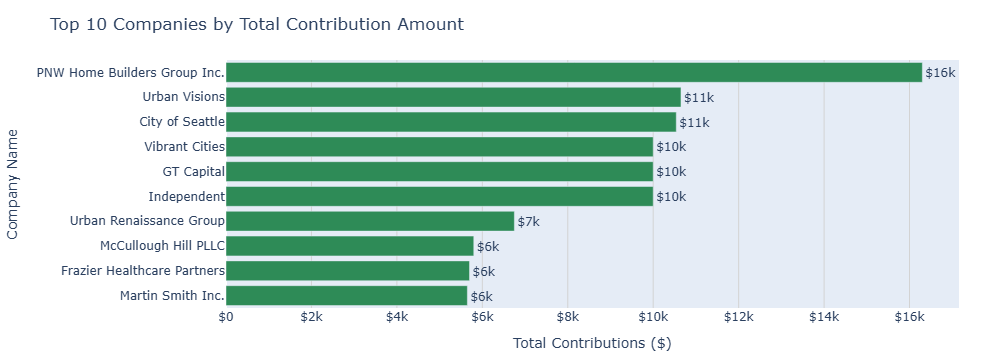
The Seattle mayoral race continues to be a hive of activity. Earlier this month, the MLK County Labor Council announced it was extending an endorsement to Katie Wilson, the Seattle Transit Riders Union head who is challenging Mayor Bruce Harrell from the left. MLK Labor had backed only Harrell in the primary, but pivoted to a dual endorsement after Wilson won the August primary by nearly 10 points.
The MLK Labor Council represents more than 160 unions and 220,000 workers across King County. Leading up to the vote, the largest union in MLK Labor, UFCW 3000, which represents grocery and food service workers, extended a sole endorsement to Wilson. Since MLK Labor’s endorsement is determined by a vote that is weighted by number of members in each union, UFCW’s support went a long way toward tipping the balance.
“Our members support a leader for Seattle who will champion worker priorities, and Katie Wilson has proven herself to be that leader time and again,” Faye Guenther, President of UFCW 3000, said. “She won the highest minimum wage in the country, she spearheaded free and reduced transit, she secured stronger renter protections, and our members feel confident that she will build on those victories to build a Seattle that works for working people.”
Wilson and UFCW 3000 announced the endorsement outside the Lake City Fred Meyer grocery store that corporate owner Kroger announced would soon be closing in October — along with three other Puget Sound area stores. Along with the Wilson nod, UFCW rolled out their “Fresh Food for All campaign, which will make food deserts bloom with fresh, affordable produce and prevent grocery giants from stomping all over our communities.”
Kroger says it’s closing stores because of retail crime or high wages. But it’s really about one thing: corporate greed. I am excited to work with UFCW 3000 on their Fresh Food for All campaign to ensure that all neighborhoods in our city have access to healthy food and medicine.
— Katie Wilson for Seattle (@wilsonforseattle.bsky.social) August 28, 2025 at 11:57 AM
[image or embed]
“Food deserts aren’t a natural phenomenon,” UFCW 3000 wrote. “They occur when giant grocery corporations abandon working-class communities in search of higher profits. To protect our neighborhoods, Seattle should support public-private partnership grocery stores to keep food affordable and accessible for all.”
Wilson joined the grocery workers union in expressing interest in exploring a public option for grocery stores to combat grocer closures and food deserts. In explaining their endorsement, UFCW workers pointed to Wilson’s history of joining workers on the picket line, standing to “corporate bullies,” and fighting for a more affordable Seattle for working people.
“Our members stock the shelves, staff the hospitals, and serve every neighborhood in this city,” said UFCW Executive Board Member and Ballard QFC Cashier Amy Dayley Angell. “Katie Wilson has marched with us on the picket line and fought off corporate bullies to raise wages for all working people, so we know she’s ready to take on the big battles to make Seattle affordable for everyone.”
Wilson earned PROTEC 17’s sole endorsement in July, ahead of the primary election. PROTEC 17 represents thousands of city government workers.
“I’m proud that my campaign has united so many labor unions and working people in support of a vision for a more affordable Seattle, and I am honored to receive this endorsement. Together we can protect and expand workers rights, build affordable housing, and make Seattle a city where families can thrive,” Wilson said in a statement.

Wilson’s campaign also claimed sole endorsements of all Democratic Party organizations in the city, The Stranger, and of The Urbanist Elections Committee (of which I am one of 14 members). Climate leaders like Bill McKibben have also joined Wilson’s side, writing in the New Yorker that a new wave of progressive leaders like her and Zohran Mamdani could help redeem the Democratic Party.
Harrell’s efforts to circle the wagons
Harrell has been scrambling to counter the momentum on Wilson’s side after her primary win and new endorsements. Earlier this week, Harrell rolled out an endorsement from Pete Buttigieg, the former transportation secretary under President Joe Biden and former mayor of South Bend, Indiana.
“Mayor Bruce Harrell is delivering the positive change Seattle needs — affordable housing, safer streets, and expanded child care,” Buttigieg said in the prepared video. “He is a principled, nationally recognized leader in the fight to protect the rights of marginalized communities, as reflected in his lifelong work for equity and fairness, and rooted in the experience of his own family. I’ve worked closely with him to deliver better infrastructure for the city and region, and have seen firsthand his commitment and effectiveness. I’m proud to support Bruce because he brings people together, turns vision into action, and is building a Seattle where everyone can thrive.”
Harrell welcomed the endorsement by posting a video of Buttigieg announcing his support on his website and social media channels, hailing Buttigieg as “a needed leader within the Democratic Party.” Since his primary loss, Harrell’s campaign has gone to great lengths to frame his as fighting the status quo, rather than upholding or being apart of it.
“I am so honored to have earned the endorsement of Secretary Buttigieg, an inspiring and national leader in our fight to define a positive Democratic vision in the face of unrelenting Trump attacks,” Harrell said in a statement. “Pete’s support is a validation of the work I am doing here in Seattle to change the status quo on affordability and liveability, and the national role I am proud to play in providing diverse representation and principled leadership in challenging times.”
Whether Buttigieg moves the needle much with voters 2,100 miles from his home city remains to be seen.
Harrell on the attack in debates
Beyond pulling in some national endorsements, Harrell has also taken a more aggressive tone against his opponent, who he oddly refuses to refer to by name during debates — even as he empties his campaign opposition research book on her. His campaign has ramped up attacks about Wilson’s purported lack of executive credentials and claimed she supports “defunding the police” due to her ties to the Solidarity Budget coalition, which formed in 2020 in the wake of George Floyd murder. His campaign could not point to an instance of Wilson using the phrase herself.
Wilson’s public safety plan noted it’s “good news” that police hiring is picking up, but criticized the City’s approach to curbing gun violence under Mayor Harrell, citing a recent audit that found police failed to follow best practices or effectively coordinate their response.
Wilson called on Sinclair Broadcast Group to reinstate Jimmy Kimmel’s show and announced that she will not participate in the debate that Sinclair-owned KOMO is scheduled to host on October 8th unless and until he returns to the local airwaves.
— The Urbanist (@theurbanist.org) September 25, 2025 at 3:41 PM
[image or embed]
At a recent fundraiser in Chinatown, Harrell portrayed his belligerence as part of his appeal in remarks covered by NW Asian Weekly.
“You have in me the ultimate warrior,” Harrell reportedly said. “When I played football, I was a linebacker. I don’t run away from contact; I run right into it. That’s what you’re going to need for this next mayor to fight for what we believe in here in Seattle.”
Harrell is also using budget season to roll out a handful of initiatives, including a reparations fund. He’s hosted nearly a press conference per day for much of September, seeking to get his message out there, and increasingly using City social media channels and resources to do it.
Harrell camp building war chest
Another way the Harrell camp has tried to stave off Wilson’s strong challenge is through fundraising. While both candidates are participating in Seattle’s democracy voucher program and have raised a similar amount on the campaign side, Harrell supporters are beginning to ramp up outside spending in a big way. A pro-Harrell political action committee (PAC) called Bruce Harrell for Seattle’s Future has raised more than $900,000 already, with contributions likely to spike as ballots drop in October.

Wilson supporters are seeking to combat that deluge of money through their own PAC. PROTEC 17 launched the Katie Wilson for an Affordable Seattle PAC shortly after they rolled out their endorsement, and other unions and progressive advocates have joined the effort.
“Challenger Katie Wilson’s 51% victory in the 2025 primary for Mayor of Seattle was remarkable. It is the first time a challenger for mayor has broken the 50% threshold since 1973, and one of the strongest results in Seattle history,” the pro-Wilson PAC wrote in their launch announcement. “She achieved this result despite independent expenditures funded by massive corporations that raised over $350,000 for Mayor Bruce Harrell in the primary. Big business is sure to triple down in the general election, determined to buy Harrell another term. In response, progressive leaders and unions are launching a counter-effort: Katie Wilson for an Affordable Seattle.”
The folks behind the PAC noted that outside “independent expenditures” (IE) are likely to dominate general election spending since Seattle’s democracy voucher system caps each campaign at $450,000 for the general election (on top of the $450,000 cap for the primary). Meanwhile, IE faces no cap and plenty of deep-pocketed donors willing to push the limit, as Amazon’s 2019 $1.5 million contribution to a business-aligned centrist PAC famously demonstrated.
Correction: The article originally misstated the general election voucher cap at $350,000 per campaign. In fact, it is $450,000. This was corrected at 5:20pm Thursday.
Doug Trumm is publisher of The Urbanist. An Urbanist writer since 2015, he dreams of pedestrian streets, bus lanes, and a mass-timber building spree to end our housing crisis. He graduated from the Evans School of Public Policy and Governance at the University of Washington in 2019. He lives in Seattle's Fremont neighborhood and loves to explore the city by foot and by bike.


